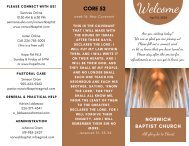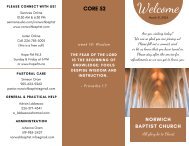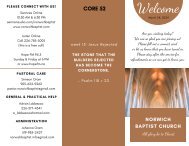Colossians Part 1 - An introduction
These are the notes that accompany our studies in the letter to the Colossians. Part one is an introduction to the letter and sets the scene for this series of studies.
These are the notes that accompany our studies in the letter to the Colossians. Part one is an introduction to the letter and sets the scene for this series of studies.
Create successful ePaper yourself
Turn your PDF publications into a flip-book with our unique Google optimized e-Paper software.
Notes from Growth Group<br />
study on the 1 st of February<br />
2024<br />
<strong>Part</strong> 1 – Overview of<br />
<strong>Colossians</strong><br />
ABSTRACT<br />
<strong>Colossians</strong> 1v 18, ‘<strong>An</strong>d He is the head of<br />
the body, the church, who is the<br />
beginning, the firstborn from the dead,<br />
that in all things He may have the<br />
preeminence.’
Home Growth Group meeting – February 1 st 2024<br />
<strong>Part</strong> 1 - Overview of <strong>Colossians</strong>:<br />
Key theme: Jesus Christ is preeminent.<br />
Key verse: <strong>Colossians</strong> 1v 18, ‘<strong>An</strong>d He is the<br />
head of the body, the church, who is the<br />
beginning, the firstborn from the dead, that in<br />
all things He may have the preeminence.’<br />
<strong>Colossians</strong> 1 v 1 - 2<br />
Where did the church of Jesus Christ in<br />
Colossae come from?<br />
Do the heavenly bodies have any influence over our lives? The millions of people who consult<br />
their horoscopes each day would say, “Yes!” In the USA, there are about 1,750 daily<br />
newspapers, and 1,220 of them carry astrological data!<br />
Is there any relationship between diet and spiritual living?<br />
Does God speak to us immediately, in our minds, or only through His Word, the Bible?<br />
Do the Eastern religions have something to offer the evangelical Christian?<br />
These questions sound very contemporary. Yet they are the very issues Paul dealt with in his<br />
magnificent epistle to the <strong>Colossians</strong>. We need this important letter today just as they needed<br />
it back in AD 60 when Paul wrote it.<br />
The City<br />
Colosse was one of three cities located about one hundred miles inland from Ephesus. The<br />
other two cities were Laodicea and Hierapolis (Col. 4:13, 16). This area was a meeting point of<br />
East and West because an important trade route passed through there. At one time, all three<br />
cities were growing and prosperous, but gradually Colosse slipped into a second-rate position.<br />
It became what we would call a small town. Yet the church there was important enough to<br />
merit the attention of the apostle Paul.<br />
All kinds of philosophies mingled in this cosmopolitan area, and religious hucksters abounded.<br />
There was a large Jewish colony in Colosse, and there was also a constant influx of new ideas<br />
and doctrines from the East. It was fertile ground for religious speculations and heresies!<br />
The Church<br />
1 | P a g e
Colosse probably would never have been mentioned in the New Testament had it not been for<br />
the church there. The city is never named in the book of Acts because Paul did not start the<br />
Colossian church, nor did he ever visit it. Paul had heard of their faith (Col. 1:4, 9), but he had<br />
never seen these believers personally (Col. 2:1). Here was a church of unknown people, in a<br />
small town, receiving an inspired letter from the great apostle Paul!<br />
How did the Colossian church begin? It was the outgrowth of Paul’s three-year ministry in<br />
Ephesus (Acts 19; 20:17–38). So effective was the witness of the church at Ephesus that “all<br />
they which dwelt in Asia heard the word of the Lord Jesus, both Jews and Greeks” (Acts<br />
19:10). This would include people in Colosse, Laodicea, and Hierapolis.<br />
When we examine the persons involved in the prison correspondence of Paul (see Eph., Phil.,<br />
Col., Philem., and 2 Tim.), we can just about put the story together of how the Colossian<br />
church was founded. During Paul’s ministry in Ephesus, at least two men from Colosse were<br />
brought to faith in Jesus Christ— Epaphras and Philemon (see Philem. 19). Epaphras apparently<br />
was one of the key founders of the church in Colosse, for he shared the gospel with his friends<br />
there (Col. 1:7). He also had a ministry in the cities of Hierapolis and Laodicea (Col. 4:12–13).<br />
Philemon had a church meeting in his home (Philem. 2). It is likely that Apphia and Archippus,<br />
mentioned in this verse, were respectively the wife and son of Philemon, and that Archippus as<br />
the pastor of the church (Col. 4:17).<br />
There is a good lesson for us here: God does not always need an apostle, or a “full-time<br />
Christian worker” to get a ministry established. Nor does He need elaborate buildings and<br />
extensive organizations. Here were two laymen who were used of God to start ministries in at<br />
least three cities. It is God’s plan<br />
that the Christians in the large<br />
urban areas like Ephesus reach out<br />
into the smaller towns and share<br />
the gospel.<br />
Is your church helping to evangelize<br />
“small-town” mission fields? The<br />
Colossian assembly was<br />
predominantly Gentile in its<br />
membership. The sins that Paul<br />
named (Col. 3:5–9) were commonly<br />
associated with the Gentiles, and<br />
his statement about the mystery<br />
applied more to the Gentiles than<br />
2 | P a g e
to the Jews (Col. 1:25–29). The church was probably about five years old when Paul wrote this<br />
letter.<br />
Discussion Question for <strong>Colossians</strong> - Introduction<br />
1. Did Paul visit Colossae in person? (Col 1v4&9, Ch2v1)<br />
2. How did the church in Colossae begin? (Acts 19 & 20 v 17-18)<br />
3. Talk about the effective witness of churches and individuals today.<br />
Are there any differences from that which took place in Paul’s day?<br />
4. Who is needed to plant a church today? Do we need a missionary or<br />
professional church planter?<br />
5. Are we as a church (NBC) doing all we can to reach our town and<br />
community? Think of things that we could do better or things that<br />
we need to start doing to help in our witness to people around us.<br />
3 | P a g e

















